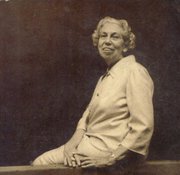Thursday, July 1, 2010
It's difficult for to imagine mayonnaise as exotic at all, but Eudora Welty remembers its advent in Jackson as an event.
Welty's use of foods in her fiction brings two notable examples to my mind; the green-tomato pickle in "Why I Live at the P.O." and the shrimp boil at Baba's in "No Place for You, My Love". But she also wrote the introductions for three Jackson cookbooks that I know of, Winifred Green Cheney's Southern Hospitality (1976), The Country Gourmet (1982), put out by the Mississippi Animal Rescue League and The Jackson Cookbook (1971), which was compiled by the Symphony League of Jackson. Mark Kurlansky, in his The Food of a Younger Land (2009), includes an essay of hers entitled "Mississippi Food" that Kurlansky claims was "a mimeographed pamphlet that she wrote for the Mississippi Advertising Commission and which they distributed." Kurlansky doesn't provide a date for the essay, but it was doubtless written in the 1930s.
More on that essay in a later post, but back to her introduction to The Jackson Cookbook, "The Flavor of Jackson", which is a gem of Southern culinary exposition. An editor of mine recently expressed some degree of surprise that Jackson had a culinary history "worth writing about", and we need no more proof than Welty's essay. Most of it concerns home cooking, of course, since restaurants in the early half of the twentieth century here were rather much a novelty, but it is a fine piece of writing that has a wonderful flavor all its own.
I'm including a part of it here, specifically the section dealing with mayonnaise because it reveals just how exotic this now-prosaic kitchen item was here at one time.
"As a child, I heard it said that two well-travelled bachelors of the town, Mr. Erskin Helm and Mr. Charles Pierce, who lived on Amite Street, had ‘brought mayonnaise to Jackson'. Well they might have though not in the literal way I pictured the event. Mayonnaise had a mystique. Little girls were initiated into it by being allowed to stand at the kitchen table and help make it, for making mayonnaise takes three hands. While the main two hands keep up the uninterrupted beat in the bowl, the smaller hand is allowed to slowly add the olive oil, drop-by-counted-drop. The solemn fact was that sometimes mayonnaise didn't make. Only the sudden dash of the red pepper into the brimming, smooth-as-cream bowlful told you it was finished and a triumph. Of course you couldn't buy mayonnaise and if you could, you wouldn't. For the generation bringing my generation up, everything made in the kitchen started from scratch."
Welty goes on to describe a typical Jackson kitchen in the twenties and thirties, and mentions a great many women who made significant contributions to the local cuisine. If you can find a copy of this book, buy it; it happens to be a superlative cookbook as well, but at the very least, find a copy at a library, if you can, and read about Jackson's culinary history from a master of her craft.

Comments
Use the comment form below to begin a discussion about this content.
Sign in to comment
Or login with:
OpenID